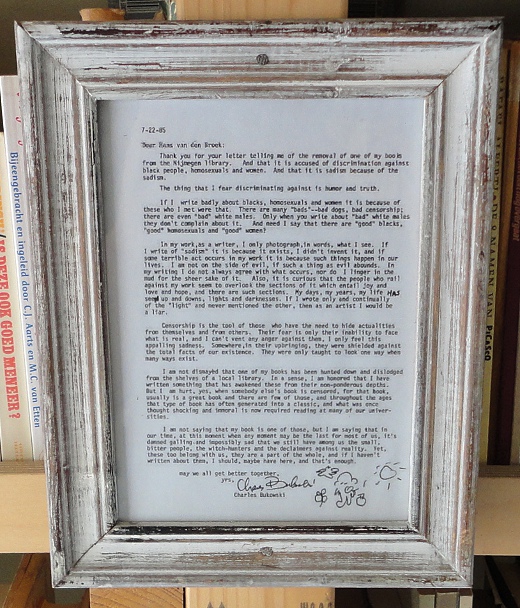Het begon ermee dat Hans van den Broek, in 1985 verslaggever voor vijftien cent per regel bij het Nijmeegs Dagblad, een tip kreeg. De Openbare Bibliotheek in Nijmegen zou een boek van de Amerikaanse schrijver Charles Bukowski uit de roulatie hebben gehaald.
(bron)
Het boek Tales of Ordinary Madness van Charles Bukowski zou ‘sadistisch’ en ‘discriminerend’ zijn. En dus stuurde Bukowski de bibliotheek een brief. Ik quote daaruit:
In my writing I do not always agree with what occurs, nor do I linger in the mud for the sheer sake of it. Also, it is curious that the people who rail against my work seem to overlook the sections of it which entail joy and love and hope, and there are such sections. My days, my years, my life has seen up and downs, lights and darknesses. If I wrote only and continually of the “light” and never mentioned the other, then as an artist I would be a liar.
Censorship is the tool of those who have the need to hide actualities from themselves and from others. Their fear is only their inability to face what is real, and I can’t vent any anger against them. I only feel this appalling sadness. Somewhere, in their upbringing, they were shielded against the total facts of our existence. They were only taught to look one way when many ways exist.
Doe mij rauw en puur maar. Daarom hou ik ook zo van Bukowski, omdat hij de ballen had om zijn leven zo eerlijk op te schrijven. Alsof hij niets te verliezen had. En dat had ‘ie ook niet. Mensen die verliezen zijn altijd diegenen die zich denken in te moeten houden.

(via Letters Of Note en BoingBoing)
Geef een reactie